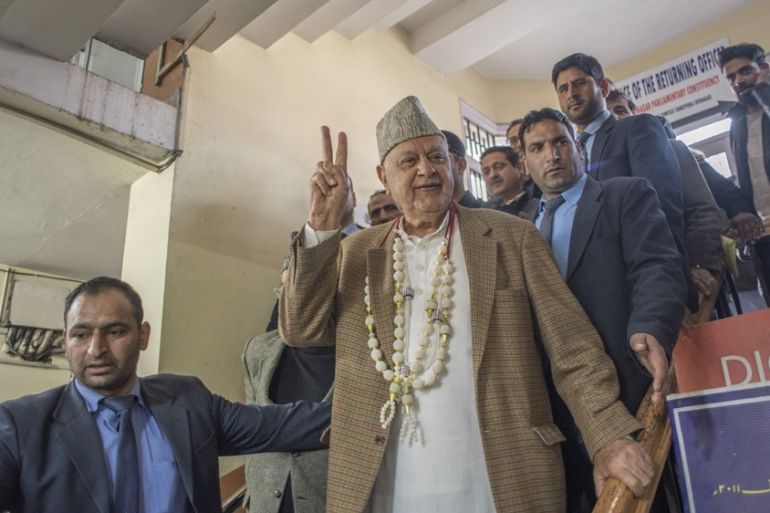India arrests Kashmir leader Abdullah under controversial law
Farooq Abdullah was arrested under a law that allows imprisoning someone for up to two years without charge or trial.

A senior pro-India Kashmiri politician was arrested under a controversial law that allows authorities to imprison someone for up to two years without charge or trial.
Farooq Abdullah, 82, a former chief minister of Indian-administered part of the disputed region who ruled Jammu and Kashmir for three terms and was a minister in different federal governments, was on Monday arrested under the Public Safety Act (PSA) in Srinagar, the capital of the disputed Himalayan region.
Keep reading
list of 4 itemsAs Israel attacked Gaza’s north, 26 members of his family were wiped out
What is Trident, the US floating pier off Gaza? Will it work?
Does Israel’s Netanyahu have a plan for a ‘day after’ the war on Gaza?
Abdullah has been under house arrest since August 5 when Indian Prime Minister Narendra Modi‘s Hindu nationalist government stripped Kashmir of its special status and imposed a security lockdown.
“We have arrested him, and a committee will decide how long the arrest will be,” said Muneer Khan, a top police official in Kashmir.
Rights activists say more than 20,000 Kashmiris have been arrested under the PSA since it came into effect in 1978.
It has been widely used against rebels after an armed rebellion erupted against Indian rule in the region in 1989.
Amnesty International has called the PSA a “lawless law”, and rights groups say India has used the law to stifle dissent and circumvent the criminal justice system, undermining accountability, transparency, and respect for human rights.
On August 6, Home Minister Amit Shah denied to the lower house of parliament that Abdullah had been detained or arrested.
“If he (Abdullah) does not want to come out of his house, he cannot be brought out at gunpoint,” Shah said, when other parliamentarians expressed concern over Abdullah’s absence during the debate on Kashmir’s status.
Meanwhile, the Supreme Court has sought a response from the central government and the Kashmir administration on a plea seeking to produce Abdullah before the court.
Thousands of protesters, as well as pro-India Kashmiri leaders, have been thrown into jails and other makeshift facilities to contain protests against India’s decisions, according to police officials.
Tens of thousands of additional Indian troops have been deployed in the Muslim-majority region, already one of the world’s most militarised regions in the world.
Telephone communications, mobile phone coverage, broadband internet and cable TV services were cut off in the valley, home to about 7 million people, in early August. However, communications have partially been restored gradually.
About 70,000 people have been killed since the 1989 armed uprising and a subsequent Indian military crackdown.
Kashmir’s special status was instituted shortly after India achieved independence from Britain in 1947. Both India and Pakistan claim Kashmir in its entirety but control parts of it.